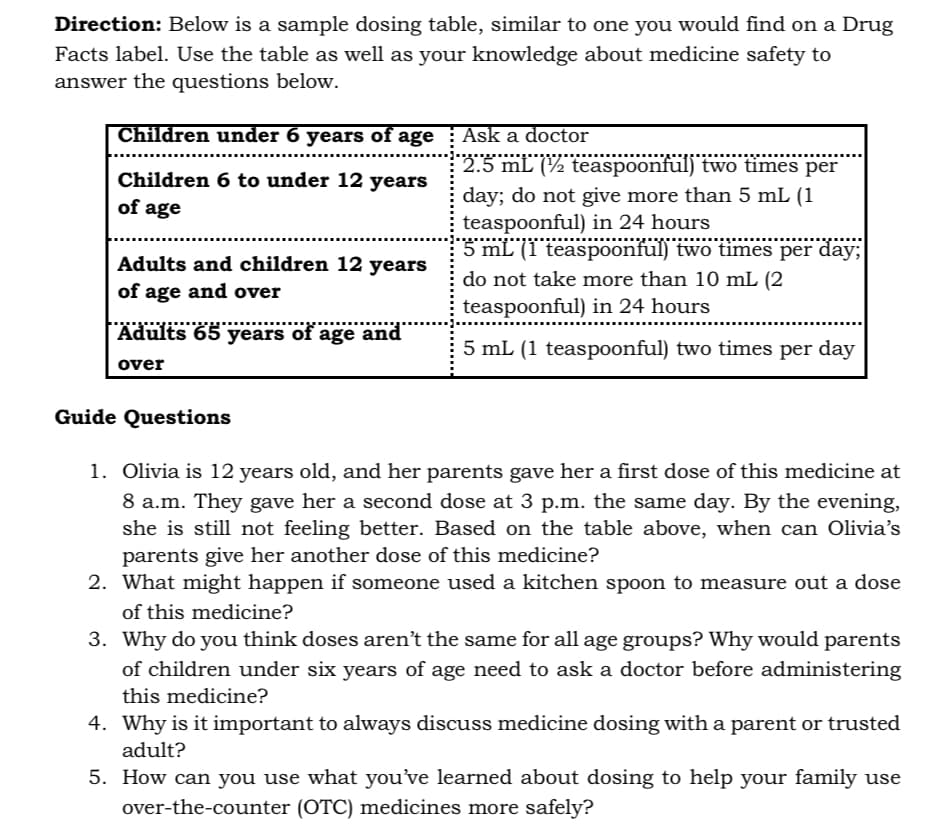Direction: Below is a sample dosing table, similar to one you would find on a Drug Facts label. Use the table as well as your knowledge about medicine safety to answer the questions below. Children under 6 years of age Ask a doctor Children 6 to under 12 years of age 2.5 mL (½ teaspoonful) two times per day; do not give more than 5 mL (1 teaspoonful) in 24 hours Adults and children 12 years of age and over 5 mL (1 teaspoonful) two times per day; do not take more than 10 mL (2 teaspoonful) in 24 hours Adults 65 years of age and 5 ml (1 teaspoonful) two times per day over Guide Questions 1. Olivia is 12 years old, and her parents gave her a first dose of this medicine a 8 a.m. They gave her a second dose at 3 p.m. the same day. By the evening she is still not feeling better. Based on the table above, when can Olivia parents give her another dose of this medicine? 2. What might happen if someone used a kitchen spoon to measure out a dos of this medicine? 3. Why do you think doses aren't the same for all age groups? Why would parent of children under six years of age need to ask a doctor before administerin this medicine?
Direction: Below is a sample dosing table, similar to one you would find on a Drug Facts label. Use the table as well as your knowledge about medicine safety to answer the questions below. Children under 6 years of age Ask a doctor Children 6 to under 12 years of age 2.5 mL (½ teaspoonful) two times per day; do not give more than 5 mL (1 teaspoonful) in 24 hours Adults and children 12 years of age and over 5 mL (1 teaspoonful) two times per day; do not take more than 10 mL (2 teaspoonful) in 24 hours Adults 65 years of age and 5 ml (1 teaspoonful) two times per day over Guide Questions 1. Olivia is 12 years old, and her parents gave her a first dose of this medicine a 8 a.m. They gave her a second dose at 3 p.m. the same day. By the evening she is still not feeling better. Based on the table above, when can Olivia parents give her another dose of this medicine? 2. What might happen if someone used a kitchen spoon to measure out a dos of this medicine? 3. Why do you think doses aren't the same for all age groups? Why would parent of children under six years of age need to ask a doctor before administerin this medicine?
Chemistry: The Molecular Science
5th Edition
ISBN:9781285199047
Author:John W. Moore, Conrad L. Stanitski
Publisher:John W. Moore, Conrad L. Stanitski
Chapter13: The Chemistry Of Solutes And Solutions
Section: Chapter Questions
Problem 57QRT
Related questions
Question

Transcribed Image Text:Direction: Below is a sample dosing table, similar to one you would find on a Drug
Facts label. Use the table as well as your knowledge about medicine safety to
answer the questions below.
Children under 6 years of age ¦ Ask a doctor
Children 6 to under 12 years
of age
2.5 mL (½ teaspoonful) two times per
day; do not give more than 5 mL (1
teaspoonful) in 24 hours
Adults and children 12 years
of age and over
5 mL (1 teaspoonful) two times per day;
do not take more than 10 mL (2
teaspoonful) in 24 hours
Adults 65 years of age and
5 ml (1 teaspoonful) two times per day
over
Guide Questions
1. Olivia is 12 years old, and her parents gave her a first dose of this medicine at
8 a.m. They gave her a second dose at 3 p.m. the same day. By the evening,
she is still not feeling better. Based on the table above, when can Olivia's
parents give her another dose of this medicine?
2. What might happen if someone used a kitchen spoon to measure out a dose
of this medicine?
3. Why do you think doses aren't the same for all age groups? Why would parents
of children under six years of age need to ask a doctor before administering
this medicine?
4. Why is it important to always discuss medicine dosing with a parent or trusted
adult?
5. How can you use what you've learned about dosing to help your family use
over-the-counter (OTC) medicines more safely?
Expert Solution
This question has been solved!
Explore an expertly crafted, step-by-step solution for a thorough understanding of key concepts.
This is a popular solution!
Trending now
This is a popular solution!
Step by step
Solved in 2 steps

Knowledge Booster
Learn more about
Need a deep-dive on the concept behind this application? Look no further. Learn more about this topic, chemistry and related others by exploring similar questions and additional content below.Recommended textbooks for you

Chemistry: The Molecular Science
Chemistry
ISBN:
9781285199047
Author:
John W. Moore, Conrad L. Stanitski
Publisher:
Cengage Learning


Chemistry: The Molecular Science
Chemistry
ISBN:
9781285199047
Author:
John W. Moore, Conrad L. Stanitski
Publisher:
Cengage Learning
